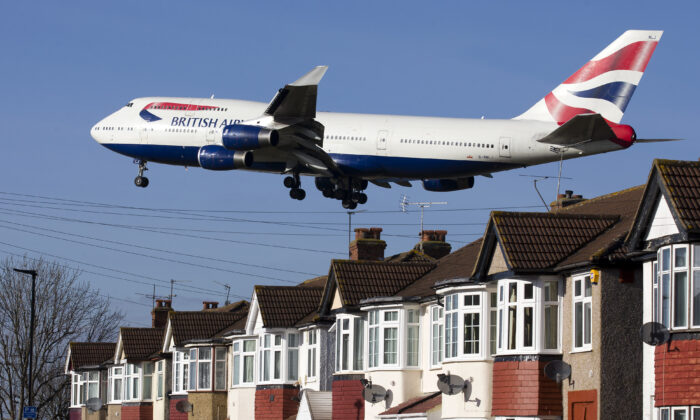Scientists who specialise in climate change take “significantly” more flights—an activity they believe contributes to global warming—than any other researchers, according to a new study.
Climate change researchers flew five times per year while their counterparts flew only four times annually, the study, carried out by a research centre based at Cardiff University, found.
Even taking into account that climate change researchers did more fieldwork, they still flew more than the others. And the more senior in their field they were, the more flying they did, according to the Centre for Climate Change and Social Transformations (CAST).
The researchers were more likely than their counterparts, however, to “offset” the flights they had made, including by using alternative methods of travelling to work or avoiding travelling, the study, published in the journal Global Environmental Change, found.
For example, 29 percent of climate researchers would choose not to go to a work event due to the carbon footprint associated with the travel compared to 5 percent of researchers from other disciplines.
‘Unexpected’ findings
CAST initially surveyed 1,400 university researchers in 2017 about travel related to their work. It followed up with a further study that year involving 350 researchers on the practicalities of choosing “lower carbon travel options.”
CAST director Lorraine Whitmarsh, a professor of environmental psychology who headed the study, said in a statement that the findings were “unexpected” and showed it was difficult for people to live up to their environmental pledges.
“Our findings highlight that climate scientists, like many other professionals, can struggle to square their environmental commitments with competing professional and personal demands and academia itself is not doing enough to change this culture,” she said.
Whitmarsh said the findings showed the need for policies to encourage low carbon choices and that the CCP virus pandemic had presented “virtual options” like online conferencing as an alternative to physical travel.
According to Whitmarsh, though the data was gathered two years ago, it was still relevant as “little had changed in academia up until the global pandemic this year”.
“It’s vital that new ways of working adopted during lockdown are embraced in the long term, not just for universities but for many other organisations and businesses that have tended to have high carbon footprints from travel,” she added.
Carbon-Neutral Growth
Air travel has been severely impacted in 2020 due to the restrictions imposed to restrict the spread of the CCP (Chinese Communist Party) virus, but may make a recovery to pre-COVID-19 passenger numbers by 2024, according to the International Air Transport Association (IATA), and from there continue to grow.
Before the pandemic, the aviation industry contributed around 2 percent of all man-made global carbon emissions, and 12 percent of all emissions associated with transport, according to industry body the Air Transport Action Group.
Though not covered by the Paris Agreement, the industry has pledged to grow in a “carbon neutral” way from 2020, and also aims to reduce net CO2 emissions by half compared to 2005 levels by 2050. This would be achieved through improvements in technology, fuel efficiency, and infrastructure changes.
Michael Shellenberger, a life-long activist for a “greener planet,” in his 2020 book “Apocalypse Never: Why Environmental Alarmism Hurts Us All” says that carbon emissions are already in decline globally.
“Carbon emissions peaked and have been declining in most developed nations for more than a decade,” he wrote.
He is an advocate of natural gas and nuclear energy, which he says both significantly reduce carbon emissions, but are still reliable and efficient sources of energy compared to renewables.
“Natural gas reduced emissions 11 times more than solar energy and 50 percent more than wind energy in the U.S.,” Shellenberger explained in a February 2020 article in Forbes, adding that “natural gas has been the main driver of declining emissions in Great Britain”.
Focus News: Climate Change Scientists Take More Flights Than Other Researchers: Study
Top Chinese Diplomat Uses Nazi Slur Against Australian Senator
